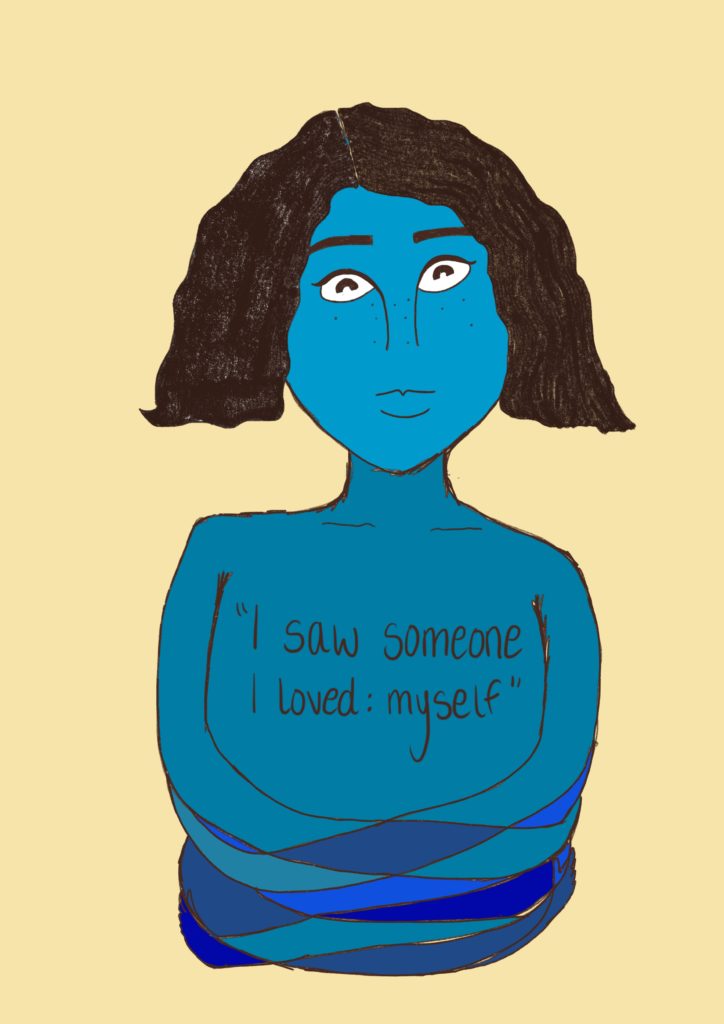
Growing up, I did everything everybody expected me to do. I pushed myself to become the daughter my parents wanted, the friend everybody liked, the best sister to my siblings, and the best student in class. Having always catered to those around me, I knew that I would one day make a good wife —- something else that was expected of me. I was constantly scrutinizing and double-checking my actions and words, trying to make sure I was making everyone around me happy. Had I just taken a second look straight ahead at the mirror in front of me — had I looked my own reflection dead in the eye — I would have realized that I didn’t recognize the person staring back at me. I didn’t recognize her because I had never stopped to think about who this person was to begin with.
I lived my life through the eyes of everyone but myself, and I lived in blissful ignorance of this fact until my dad got sick. Suddenly, the stabbing words and the pitiful stares started flowing towards me like water out of a broken dam. What changed? I still had the same grades, the same friends – I even wore the same clothes. I did everything everybody liked before. I was still the spitting image of the girl society wanted me to be, except that my father was sick now. Why did that make everybody somehow think less of me? Why did I start disliking myself?
A while later, my dad died, and I began to realize that his presence had been blinding me from a lot of things. In his absence, I realized that the reflection I now saw in the mirror was different from what I used to see – from what it used to be, or at least what I thought it was. I realized that my father’s presence had distorted my image, an image that now would never be enough. I would never be enough because I no longer had a dad. Because there was no longer a solid man in my life.
After my dad’s death, I started to hear things like:
“Oh, does she not have a man to hold her down?”
“Watch her break apart with no man by her side”
“She’s simply useless; whatever could she do to support her family?”
The hurtful words continued: “How can her mother ever do anything with a fifteen-year-old for an eldest daughter?” They wondered how my mother was supposed to wait fourteen years for my youngest brother — the only boy — to grow up and fill the shoes my father wore. Shoes, by the way, that were only three sizes too big for me.
Before my dad’s death, I merely wanted to live my life in the “right” way. I wanted to do what everyone expected — to succeed in school, land a good job, marry a good man and repeat that cycle of bland and specific expectations with my future children. But because of the loss I suffered, all those expectations shattered before my eyes. They shattered regardless of how I felt about them in the first place. I went from being the top of my class, destined for greatness, to being a woman who felt failed by her community members when she needed them most. My loss — something completely out of my hands — painted me as a failure.
I began to live through their words and perceptions. I began to feel the weight of all the pity they felt for me. I continued to do everything they wanted me to do. Yet still, they continued to invalidate me, to make me feel like I was never going to be loved or supported the way I deserved to be. That I could never be truly loved or supported, anyway. That I could never be enough. Their words weighed on me with the passing of time. I felt more and more alone. Ultimately, I reached a point where I wanted to die; I lost hope that things could get better. And somewhere in that hopeless space, I found freedom.
Not only did I find freedom, but I found a new perspective. I learned how to look into the mirror and see who I wanted to see. I didn’t need to look back anymore or to double-check and ponder about the ways others saw me.
I started making art. I drew. I painted. I wrote until I felt heard – until my screams were so loud that people turned around to see where the noise was coming from. Art was the only thing from my past self that had a sliver of autonomy. It was something I did for myself before I ever got to know myself when the system mattered more than the cogs that made it work. I held on to my art and savored it as the outlet for my true inner thoughts, cries everyone else could hear clearly now.
I did not care who was listening or how far my screams reached because I no longer made the mistake of placing my value in the thoughts and reactions of others, others who cringed at the sound of my cries. My cries that were actually my melody. Finally, I stared back at my image in the mirror — an image I’d previously let others poke holes at and crack — and I saw someone beyond the distortion. I saw someone I loved: myself.
